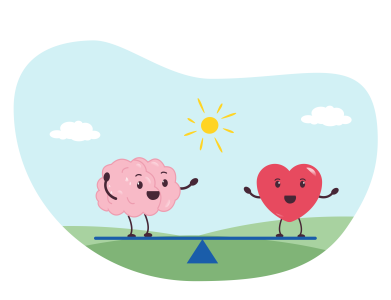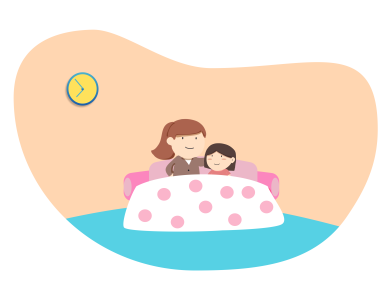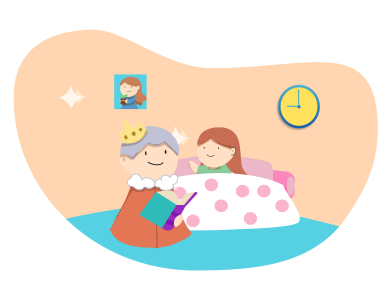
- GRIP Learning's Team
Children who have difficulties learning or concentrating can greatly benefit from developing their emotional intelligence.
In this article, let’s expand our knowledge about the four stages of cognitive development!
The Swiss psychologist Jean Piaget is famous for his studies of how young minds learn and grow. Each stage of a child’s growth, in his view, is characterized by a unique perspective on the world. Piaget’s theory of cognitive development has helped education and child development a lot, and his ideas are still important today.
In Piaget’s theory of how the mind works, there are four stages: the sensorimotor stage, the preoperational stage, the concrete operational stage, and the formal operational stage. Children must progress through each stage, which builds upon the one before it. In this essay, I’d like to dive deeper into these various phases.

First in Piaget’s theory of cognitive development is the sensorimotor stage. This time period typically begins around the time of birth and continues until the toddler years. Children at this age are just beginning to explore the world of learning through movement and sensation. Touching, tasting, smelling, hearing, and seeing are just some of the ways they learn about their environment.
During this time period, a crucial turning point is the development stage of the concept of object permanence. The concept of object permanence refers to the conviction that things exist even when we can’t see them. A child in the sensorimotor stage may mistakenly think a toy is no longer present if it is covered up with a blanket. Over time, though, they come to realize that the toy exists even if they can’t see it.
Moreover, babies also learn basic motor skills like reaching, grasping, and crawling. When kids are able to do these things, they are free to explore their surroundings and learn more about the world.
According to Piaget, the second stage of cognitive development is the preoperational stage. This period typically begins at the age of two and continues until the age of seven. At this point in development, kids start to use symbols to represent real-world things and occurrences.
Egocentrism is a prominent trait at this time. Egocentrism is the belief that everyone else has the same point of view as the child. A preoperative child might, for instance, think that someone standing behind them can see everything that they can. They lack the maturity to understand things from someone else’s viewpoint.
Language maturation is also crucial during this period. At the preoperational level, children start to use words to talk about the world around them. They might also use make-believe to learn about the world in novel ways.
Typically, this period begins at age seven and continues until age eleven. At this age, kids start to apply logic to their observations of the world.
The maturation of conservatism marks a pivotal point in this period. Conservation is the idea that the amount of a substance stays the same even if it changes shape or location. A child in the concrete operational stage would realize, for instance, that the volume of water in a wider glass remains the same.
At this stage of development, it is also important to learn how to put things into the right groups. During the concrete operational stage, children start to put things into groups based on what they have in common. In addition, they might make decisions and solve problems using logic.
For Jean Piaget, the formal operational stage represents the final phase of cognitive development. This period begins at about age 11 and lasts well into adulthood. At this point in development, people are capable of abstract, logical thought; they can understand and use sophisticated concepts.
The capacity for “hypothetical thinking” is a key trait of the formal operational stage. This entails that people have the mental capacity to consider possibilities, ideas, and outcomes not present in their immediate surroundings. They are capable of imagining a variety of outcomes and making educated guesses about them.
Developing your capacity for deductive reasoning is also essential during this phase. Using deductive reasoning, one can arrive at a conclusion by first establishing a general principle and then applying that principle to a specific scenario. As an illustrative example, a person at the formal operational stage might realize that all men are mortal and draw the conclusion that their grandfather, who is also a man, is also mortal.
Moving into the formal operational phase also helps people learn how to solve problems and make better decisions. They are able to weigh the pros and cons of different options and decide on the best course of action. They have the ability to look ahead and think about how their choices will pan out over time.
As a final step, people in the formal operational stage develop metacognition, which means they become aware of and can control how they think. They can judge how well they did by thinking about and acting on their own thoughts and actions. This paves the way for them to gain insight from their actions and make necessary modifications moving forward.
Keep in mind that not everybody gets to the fully operational level. According to Piaget, education, experience, and culture all play a role in whether or not a child reaches this stage. Some people might never get there, while others might do so much sooner or later than the average.
On the other hand, critics of Piaget’s theory say that the formal operational stage is not as common as Piaget thought it was. For example, the way the West stresses the importance of abstract thought and deductive reasoning may not be right in other cultures, which could hurt the development of the mind.
Despite its detractors, Piaget’s theory of cognitive development has had far-reaching effects on education and training for people of all ages. Piaget’s theory of cognitive development in stages emphasizes the need to meet students where they are in terms of development if we are to help them learn and grow.
In Conclusion
To sum up, Piaget’s four stages of cognitive development help us understand how children’s ability to reason and draw conclusions grows over time. When we know how children’s thinking changes as they grow, we can make educational programs that are right for each stage of their development. Yet, it’s important to remember that people can develop at different rates even within the same stage.




